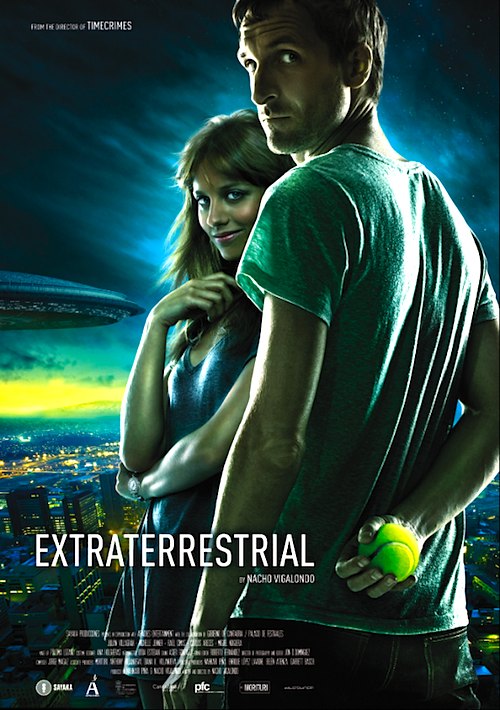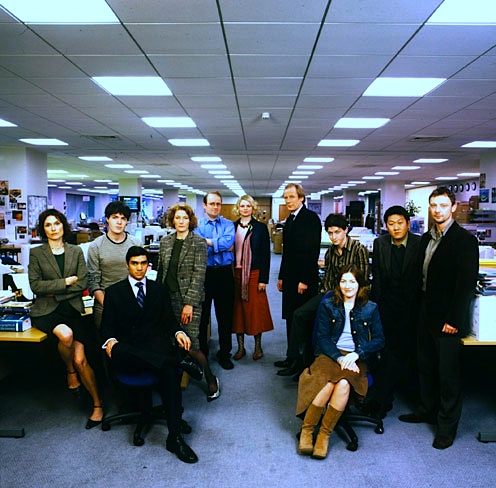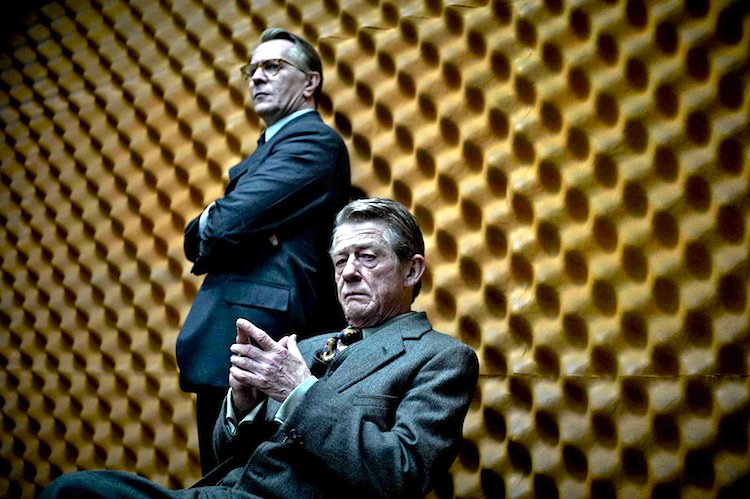
By Joe Bendel. Five ghosts haunt John le Carré’s most celebrated spy novel. The shadow of the so-called “Cambridge Four” spy ring, including the treasonous Kim Philby and Anthony Blunt, looms large over the story, especially given the circumstances of their private lives. The fifth, of course, is Sir Alec Guinness, who is so closely associated with the role of mole-hunter George Smiley. However, Obi-wan Kenobi should be smiling down on Gary Oldman, who confidently assumes the Smiley mantle in Tomas Alfredson’s appropriately cerebral adaptation of Tinker, Tailor, Soldier, Spy (trailer here), which opens this Friday in New York and elsewhere.
Smiley once was the deputy chief of the Secret Intelligence Service (a.k.a. MI6, but known colloquially as “The Circus”), but he was forced out with his boss, known as “Control,” when an operation went spectacularly wrong. As a result, a field operative (or “scalp-hunter” in Circus parlance) was captured, effectively ending Control’s related mole-hunt. Unfortunately, it turns out the late spymaster was not so paranoid after all, as the minister begrudgingly admits when he brings Smiley back into service to furtively investigate the four top officers of the Circus, code-named by Control: Tinker, Tailor, Soldier, and Spy (skipping “sailor” from the old nursery rhyme, because it is too close to “tailor”).
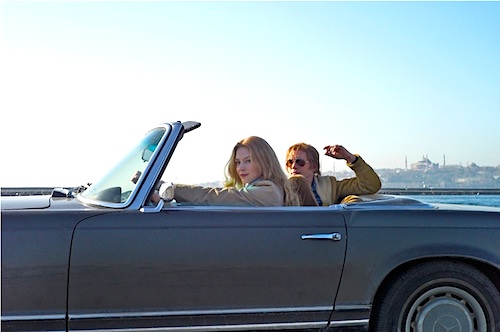
There are no explosions in TTSS, nor is there a whole lot of shooting, but when it happens, it is significant. Instead of pyrotechnics, we watch as Smiley pieces the puzzle together, interviewing a diverse cast of professional thugs and bureaucrats, gleaning tantalizing clues from each resulting flashback. Yet, perhaps most intriguing are the glimpses we get of “Karla,” the notorious Soviet intelligence mastermind (played by a rarely seen Patrick Stewart in the classic BBC series, no less). Smiley might be chasing a mole, but his real adversary is definitely Karla, who fully understands his retired rival’s weaknesses.
Gary Oldman is the key reason why the revamped TTSS works so well. In a way, Smiley could be considered the dark side of his Commissioner Gordon persona in the Dark Knight franchise. Like Guinness, he plays Smiley’s cool detachment in a way that makes it clear the gears are turning furiously within his head. Occasionally he even seems to adopt some of Sir Alec’s cadences and mannerisms, but that is fine. Frankly, those familiar with the prior incarnation will rather want to hear that echo.
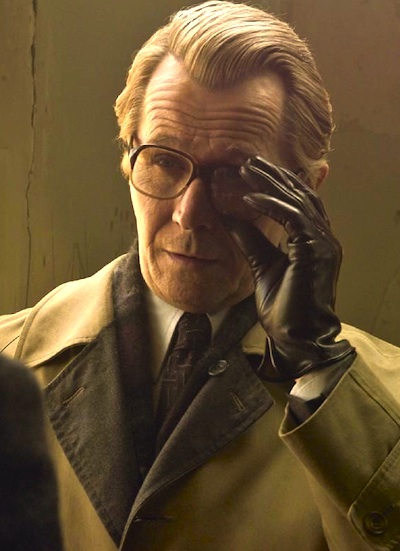
TTSS also features at least a dozen genuinely first class British actors, some famous and some who should be. John Hurt’s casting as Control is so perfect it requires no explanation. Likewise, Toby Jones, Colin Firth, and Ciarán Hinds add plenty of color as the Circus’s inner circle and Smiley’s prime suspects, by extension. Yet it is the intense and dynamic supporting work of Mark Strong and the soon to be famous Tom Hardy as scalp-hunters Jim Prideaux and Ricki Tarr that really crackle and hum.
Alfredson has helmed a sleek and brainy espionage thriller (one can see a certain kinship with his frosty, Nordic vampire tale, Let the Right One In), but TTSS is definitely a product of the le Carré school of Cold War moral equivalency. Smiley himself explicitly states there is no ethical distinction between us and them. Even the mole himself eventually explains that his decision to betray his country was largely based on aesthetics (which seems bizarre, considering he should be fully versed in the glories of Socialist Realism). Frankly, given the wealth of revelations that have flooded out of the former Soviet bloc, such revisionism seems like a dated relic of the 1970’s – but at least it matches the pseudo-retro vibe of the film.
TTSS is an absorbing big screen intrigue, even though it is relatively easy to guess the mole’s identity, solely on the basis of screen-time allotment. (Frustratingly, this means one of the best actors of our day is rather short-changed in the process.) Still, watching Oldman’s Smiley is the real show, following not just in the footsteps of Guinness but also the great James Mason (who played the character, inexplicably renamed Charles Dobbs, in Sidney Lumet’s moody but effective The Deadly Affair). He is a worthy successor, deserving serious Oscar consideration. Recommended for intelligent viewers who enjoy films about Intelligence, TTSS opens this Friday (12/9) in New York at the AMC Lincoln Square and Village 7.
Posted on December 6th, 2011 at 12:04pm.
